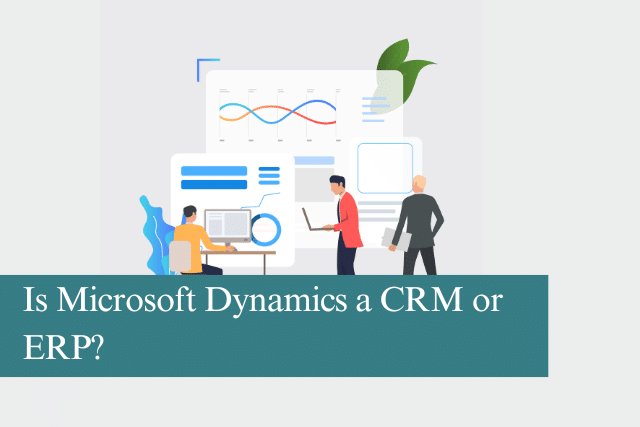
Many businesses wonder whether Microsoft Dynamics functions primarily as a CRM or an ERP system, as both are critical components for efficient business operations. The answer, however, isn’t as simple as picking one over the other.
In fact, Microsoft Dynamics offers both CRM and ERP solutions, allowing businesses to choose the tools that best suit their needs, or even combine both systems for a more holistic approach to enterprise management.
Understanding Microsoft Dynamics
Before delving into whether Microsoft Dynamics is a CRM or ERP, it’s important to understand what both CRM and ERP solutions are, and how they serve businesses.
- Customer Relationship Management (CRM): This type of software focuses on managing a company’s interactions with current and potential customers. CRM systems are designed to improve business relationships by streamlining communication, tracking customer data, managing sales leads, and helping to improve customer service.
- Enterprise Resource Planning (ERP): An ERP system, on the other hand, is a suite of applications used by organisations to manage day-to-day activities. These systems often include functionalities related to finance, human resources, manufacturing, supply chain management, procurement, and more. Essentially, an ERP integrates core business processes and allows businesses to collect, store, manage, and interpret data from various departments within a single system.
Microsoft Dynamics is a brand of software that encompasses both CRM and ERP solutions, but it’s important to understand the distinct features of each to determine which is most relevant to your business.
Microsoft Dynamics CRM
Microsoft Dynamics CRM is designed to help businesses manage customer relationships more effectively. The software offers a suite of tools for managing sales, marketing, and customer service. Key features include:
- Sales Management: Helps sales teams track leads, opportunities, and customer interactions to close more deals and build long-lasting relationships.
- Marketing Automation: Allows businesses to create and manage marketing campaigns, target specific customer segments, and measure the success of marketing efforts.
- Customer Service: Provides tools for managing customer inquiries, issues, and cases, as well as tracking service-level agreements (SLAs) and ensuring high levels of customer satisfaction.
- Integration with Microsoft 365: The integration with other Microsoft products, such as Outlook, Teams, and SharePoint, makes it easier for teams to collaborate, access customer data, and improve productivity.
This CRM solution is designed to help businesses engage with customers more effectively, increase sales, and provide exceptional service. Microsoft Dynamics CRM also offers powerful data analytics to help businesses make informed decisions about customer engagement and improve their overall marketing strategies.
Microsoft Dynamics ERP
On the ERP side, Microsoft Dynamics includes several products designed to help businesses manage their internal operations. These products include Microsoft Dynamics 365 Finance and Operations, Microsoft Dynamics NAV (now rebranded as Dynamics 365 Business Central), and Microsoft Dynamics GP. Here’s how these ERP systems help businesses:
- Financial Management: Helps track financial data, manage budgets, and produce detailed reports to ensure compliance with accounting standards and regulations.
- Supply Chain Management: Provides businesses with tools to manage procurement, inventory, and logistics, ensuring smooth supply chain operations and reducing overhead costs.
- Human Resources: Streamlines HR processes, including payroll, performance management, and employee benefits, all within a centralised system.
- Manufacturing and Production: Helps manufacturers manage production schedules, track resources, and maintain inventory levels to keep operations running smoothly.
Microsoft Dynamics ERP solutions are powerful tools for managing critical business processes that drive operational efficiency. These solutions are especially useful for larger businesses with complex workflows and a need for deep integration across multiple departments.
A Combination of CRM and ERP – Microsoft Dynamics 365
What sets Microsoft Dynamics apart from other software solutions is its unified platform, Microsoft Dynamics 365. This platform combines both CRM and ERP functionalities into a single, cloud-based system. With Dynamics 365, businesses can leverage the power of both CRM and ERP systems in one package, allowing for seamless integration across departments.
The platform offers a modular approach, meaning that businesses can choose the specific applications they need based on their requirements. For example, a company can choose to use Dynamics 365 for Sales and Marketing (CRM) alongside Dynamics 365 for Finance and Operations (ERP). This integration allows data to flow smoothly between customer-facing teams (sales and service) and internal departments (finance, HR, and supply chain), fostering better decision-making and more efficient operations.
Benefits of Microsoft Dynamics for Businesses
- Enhanced Data Visibility: With Microsoft Dynamics, businesses can have a 360-degree view of customer interactions, financial performance, and internal operations. This visibility leads to better decision-making and the ability to identify opportunities for growth.
- Scalability: Whether you are a small business or a large enterprise, Microsoft Dynamics can scale with your organisation. Its cloud-based nature allows businesses to add new features and functionalities as needed.
- Improved Collaboration: The integration of Microsoft 365 tools within Dynamics 365 allows for seamless collaboration across departments, ensuring that sales, marketing, and service teams work together more effectively.
- Customisation: Microsoft Dynamics is highly customisable, meaning businesses can tailor the system to meet their unique needs, workflows, and industry-specific requirements.
Is Microsoft Dynamics More CRM or ERP?
Ultimately, Microsoft Dynamics is both a CRM and an ERP solution, depending on how it is implemented. Organisations may choose to implement only the CRM functionality, the ERP functionality, or both, depending on their needs. The platform’s modular approach means businesses can start small and scale as they grow, all while enjoying the benefits of both CRM and ERP capabilities.
Get Managed IT Support for Your Microsoft Dynamics System
If you’re considering implementing Microsoft Dynamics for your business or you already use it and need expert guidance, it’s crucial to have the right IT support to ensure a smooth and successful deployment. Managed IT services can help you navigate the complexities of Microsoft Dynamics, providing ongoing support, troubleshooting, and system optimisation.
Contact us today to learn more about how we can help you manage your Microsoft Dynamics system and improve your business processes. Our expert team is ready to provide you with the IT support you need to maximise the value of your CRM and ERP solutions, ensuring that your business runs efficiently and stays ahead of the competition.
Recommended Posts

How to Get the Most Out of Your IT Budget
25th April 2025

10 Biggest Cybersecurity Mistakes of Small Companies
18th April 2025

The Importance of Planning in Business IT Solutions
11th April 2025
